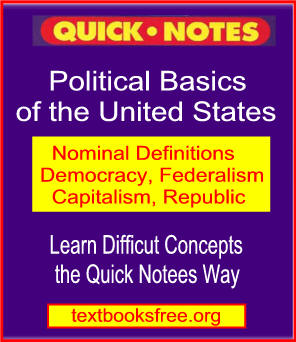|
Political Systems Are About Power Democratic Federalist Republic Characteristics continue to Capitalism Return to Political Economy Internet Library 12/22/19 Please link to and Share |
|
Political Systems Are About Power Republic power controlled by the people Commonwealth community founded for the common good Oligarchy power effectively with a few people. a.
Northwestern study concluded US is an Oligarchy.
Polyarchy
has decentralized rule with many small governments
Fascism
is a form of radical
authoritarian
nationalism
Totalitarianism holds total authority over
society and Libertarianism wants to limit government power. Dictatorship has rule by a person.
Federation
is composed of states with a common purpose. |
Democratic Federalist Republic Characteristics Political Systems involve governments and politics.
Republic
government
exists when a constitutionally determined government
a. There are many applications. What constitutes a right and Federalism divides powers among member units so that political control is constitutionally decentralized. Each unit has some final authority and self- government.
a.
US Federalism divides power with federal/state
Dual
Federalism. Democracy exists when government power resides in a constitutionally determined electorate having equal say in determining the majority will. Majority Factions aim for absolute and unlimited political power. Success is often determines by controlling . The constitution protects minority rights. |
|
|
Presidential Democracy has a president and the legislative
body. See Current Political Economy Controversies. Parliamentary Democracy as practiced in Great Brittan has an executive branch that derives its legitimacy from and is held accountable to a legislature (parliament). The executive and legislative branches are thus interconnected. A head of government called a prime minister is appointed from the majority party or from a coalition of minority parties. A Head of State is normally a different person with varying degrees of political responsibility. In England the Queen only has ceremonial responsibilities. Democratic Republic vs. Parliamentary Democracy written by President Wilson favored a parliamentary system. This would have made many founding fathers unhappy as they feared the budget instability and anarchy of the French Revolution.
|
Making Laws in a Democracy
Direct Democracy also known as pure democracy has the electorate vote directly on policy initiatives. Indirect democracy or representative democracy is when the electorate temporary delegates power to officials who make laws on their behalf. Initiatives and Referendums exist in some U.S. States. a. Part of the early 20th century Progressive Movement b. Allowed voters to put a proposed law on the ballot for approval and also to void existing state law. c. DC and 27 states have this direct democracy tool. Constitutional Amendments expanded "We" of "We the people..." which moved U.S toward Republicanism. a. The 1911 17th Amendment changed the election of U.S. Senators from the House of Representatives to voters. b. The 1919 19th Amendment gave women voting rights. c. The 1971 26th Amendment lowered voting age to 18. d. Eliminating the Electoral College would move the process closer to the people, Republicanism and a direct democracy majority. See Democracy and Virtue, Why Founders Wanted Electoral College, The Founder's Constitution extensive reading list |
|
|
Political Economy
Studies See
Capitalism 1p
|
||
|
|
||
|
|
||
